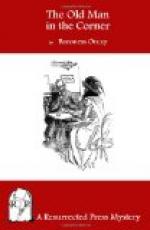“But Dublin had not exhausted its stock of sensations yet. Millionaire Brooks had been buried with due pomp and magnificence, and his will had been proved (his business and personalty being estimated at L2,500,000) by Percival Gordon Brooks, his eldest son and sole executor. The younger son, Murray, who had devoted the best years of his life to being a friend and companion to his father, while Percival ran after ballet-dancers and music-hall stars—Murray, who had avowedly been the apple of his father’s eye in consequence—was left with a miserly pittance of L300 a year, and no share whatever in the gigantic business of Brooks & Sons, bacon curers, of Dublin.
“Something had evidently happened within the precincts of the Brooks’ town mansion, which the public and Dublin society tried in vain to fathom. Elderly mammas and blushing debutantes were already thinking of the best means whereby next season they might more easily show the cold shoulder to young Murray Brooks, who had so suddenly become a hopeless ‘detrimental’ in the marriage market, when all these sensations terminated in one gigantic, overwhelming bit of scandal, which for the next three months furnished food for gossip in every drawing-room in Dublin.
“Mr. Murray Brooks, namely, had entered a claim for probate of a will, made by his father in 1891, declaring that the later will made the very day of his father’s death and proved by his brother as sole executor, was null and void, that will being a forgery.”
CHAPTER XXII
FORGERY
“The facts that transpired in connection with this extraordinary case were sufficiently mysterious to puzzle everybody. As I told you before, all Mr. Brooks’ friends never quite grasped the idea that the old man should so completely have cut off his favourite son with the proverbial shilling.
“You see, Percival had always been a thorn in the old man’s flesh. Horse-racing, gambling, theatres, and music-halls were, in the old pork-butcher’s eyes, so many deadly sins which his son committed every day of his life, and all the Fitzwilliam Place household could testify to the many and bitter quarrels which had arisen between father and son over the latter’s gambling or racing debts. Many people asserted that Brooks would sooner have left his money to charitable institutions than seen it squandered upon the brightest stars that adorned the music-hall stage.
“The case came up for hearing early in the autumn. In the meanwhile Percival Brooks had given up his racecourse associates, settled down in the Fitzwilliam Place mansion, and conducted his father’s business, without a manager, but with all the energy and forethought which he had previously devoted to more unworthy causes.
“Murray had elected not to stay on in the old house; no doubt associations were of too painful and recent a nature; he was boarding with the family of a Mr. Wilson Hibbert, who was the late Patrick Wethered’s, the murdered lawyer’s, partner. They were quiet, homely people, who lived in a very pokey little house in Kilkenny Street, and poor Murray must, in spite of his grief, have felt very bitterly the change from his luxurious quarters in his father’s mansion to his present tiny room and homely meals.




